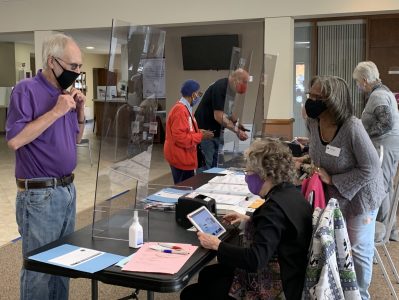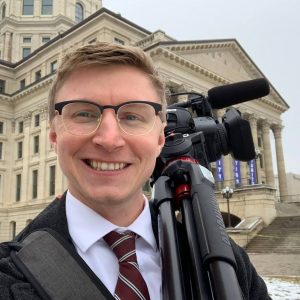Coalition files lawsuit challenging constitutionality of new Kansas election laws

photo by: Noah Taborda/Kansas Reflector
Four Kansas organizations filed a lawsuit Tuesday challenging the constitutionality of two sweeping election reform bills placed into law by the 2021 Legislature after deflecting vetoes by Gov. Laura Kelly. Here, voters cast ballots at United Methodist Church in Topeka.
TOPEKA — The League of Women Voters of Kansas and three other organizations filed a lawsuit on Tuesday challenging the constitutionality of election reforms that they described as a brazen attempt to suppress participation by minority, disabled and elderly voters.
The 2021 Legislature managed to override Democratic Gov. Laura Kelly’s vetoes of two election bills, setting up a showdown between the state and plaintiffs Kansas Appleseed Center for Law and Justice, Loud Light, Topeka Independent Living Resource Center and the League of Women Voters. Court documents allege that provisions of House Bill 2183 and House Bill 2332 violated the Kansas Constitution by interfering with Kansans’ voting, due process, free speech and association rights.
Jacqueline Lightcap, co-president of the League of Women Voters of Kansas, said it made no sense for the Republican-controlled Legislature to punish voters for generating record turnout in the November 2020 election. In all, 1.3 million Kansans voted, with 450,000 mailing in their ballots and 370,000 turning in advance ballots in person.
Lightcap said the cluster of new election laws, including changes to advance voting, would “erode turnout gains of 2020 by hindering organizations who inform and assist voters.” The League of Women Voters is among nonpartisan organizations dedicated to sharing election information, she said.
“HB 2183 and HB 2332 threaten to undermine this progress by criminalizing the vital efforts of civic organizations,” Lightcap said. “These anti-voter bills will have a disproportionate effect on voters with disabilities, voters of color, voters whose first language is not English, student voters and elderly voters.”
The suit filed in Shawnee County District Court against Attorney General Derek Schmidt and Secretary of State Scott Schwab, both Republicans, raised an alarm about a statute that prevents out-of-state groups from sending advance ballot applications to Kansans. Plaintiffs also objected to another provision that prohibits any one person from collecting more than 10 advance ballots; they allege it would disproportionately harm Kansans with disabilities, rural residents of the state and people living on tribal lands.
The court filing challenged a provision that made it a crime to “give the appearance of being an election official.” Plaintiffs said that could undercut free speech activities of organizations and concerned citizens working to ensure Kansans understood how to safely cast a ballot.
Also addressed in the suit was a new “mandated signature-match regime” that the plaintiffs said could lead to disqualification of ballots based on the conclusion of untrained election workers who don’t have clear legal standards to guide their evaluations of ballot signatures.
“The Legislature secretively and haphazardly rushed through voter restrictions that criminalize healthy parts of our democracy, such as helping Kansans register to vote or helping a neighbor turn in their ballot,” said Davis Hammet, president of Loud Light. “Loud Light has been working to improve Kansas election integrity for years, but these laws aren’t about election integrity. They’re barriers that block access to the ballot box and undermine the integrity of our democracy.”

photo by: Submitted/Kansas Reflector
Davis Hammet, president of Loud Light, is among a coalition of four organizations filing a lawsuit challenging the constitutionality of a series of election laws adopted by the 2021 Legislature after overriding a veto by Gov. Laura Kelly.
The bills also prohibit the judicial or executive branches from altering election law without consent of the Legislature. In addition, they require county officials to confirm registration addresses of prospective voters to keep illegal registrants from taking part in the manner that former U.S. Rep. Steve Watkins, a Topeka Republican, did by claiming his residential address was a UPS store.
House and Senate Republicans said the two-thirds majorities that overrode the governor demonstrated the GOP’s commitment to election integrity. These lawmakers said the changes were essential to guarantee that elections were free of corruption that many Republicans have claimed was present in 2020.
“We want to have fair, safe and transparent elections. That gives people confidence in our election system,” said Senate Majority Leader Larry Alley, a Winfield Republican.
Kansans for Life and the Family Policy Alliance of Kansas endorsed the election-reform legislation. They were concerned that abortion-rights canvassers might otherwise be capable of gathering thousands of advance ballots ahead of the August 2022 election, which will feature a proposed constitutional amendment on abortion.
— Tim Carpenter reports for Kansas Reflector.







